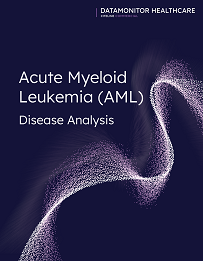Report Library
All Reports
Datamonitor Healthcare Oncology Disease Analysis: Acute Myeloid Leukemia (AML)
September 19, 2025
Since 2017, a multitude of new drugs have been approved for AML in the US, dramatically changing the treatment landscape. Gone is the era when all front-line patients received either 7+3 chemotherapy or a hypomethylating agent (decitabine or azacitidine). Many of the new therapies target specific segments of AML or patients with specific mutations. As such, there is currently little competition between new therapies, but that will change as therapies receive label expansions and new competitors are approved.
Three FLT3 inhibitors have been approved by the US Food and Drug Administration (FDA) for FLT3-mutated AML: Rydapt and Vanflyta for front-line patients eligible for intensive chemotherapy, and Xospata for relapsed/refractory patients. Rydapt faces competition in the front-line FLT3 setting from the more recently approved Vanflyta, as well as from crenolanib and Xospata, which are being evaluated in combination with standard chemotherapy. Vanflyta’s FDA label restricts its use to ITD-FLT3-positive patients, but allows for use as a maintenance therapy following consolidation, while crenolanib is also being evaluated as a single-agent maintenance therapy following chemotherapy consolidation. Approval in the lucrative maintenance setting would give these drugs a favorable long-term commercial outlook, as approximately 25–30% of AML patients have an FLT3 mutation. Out of the three contenders for Rydapt’s position in the first-line setting, Vanflyta has taken the lead, with FDA and European Medicines Agency approvals in July 2023 and November 2023, respectively. Vanflyta also received a Japanese label expansion for use in newly diagnosed FLT3-positive AML patients in May 2023.
| Indications Covered: | Acute Myelogenous Leukemia (AML) |
